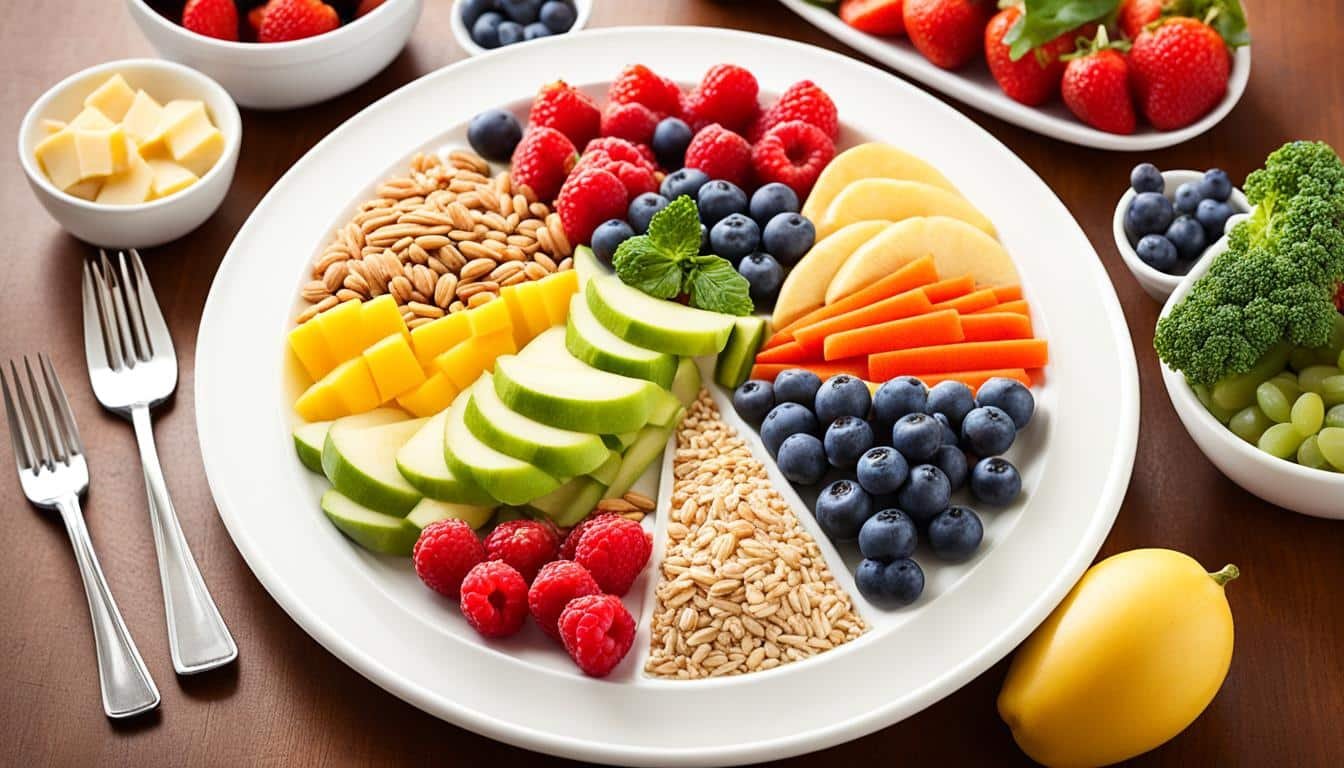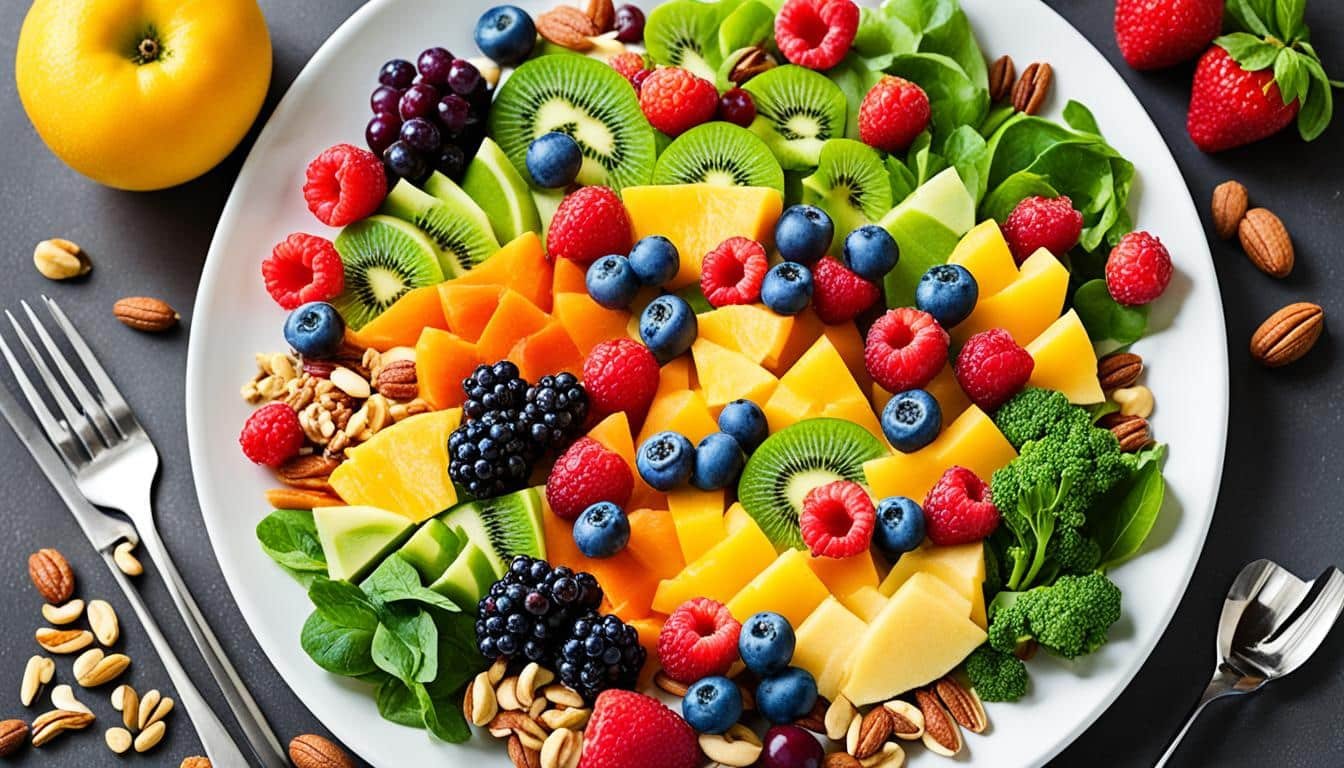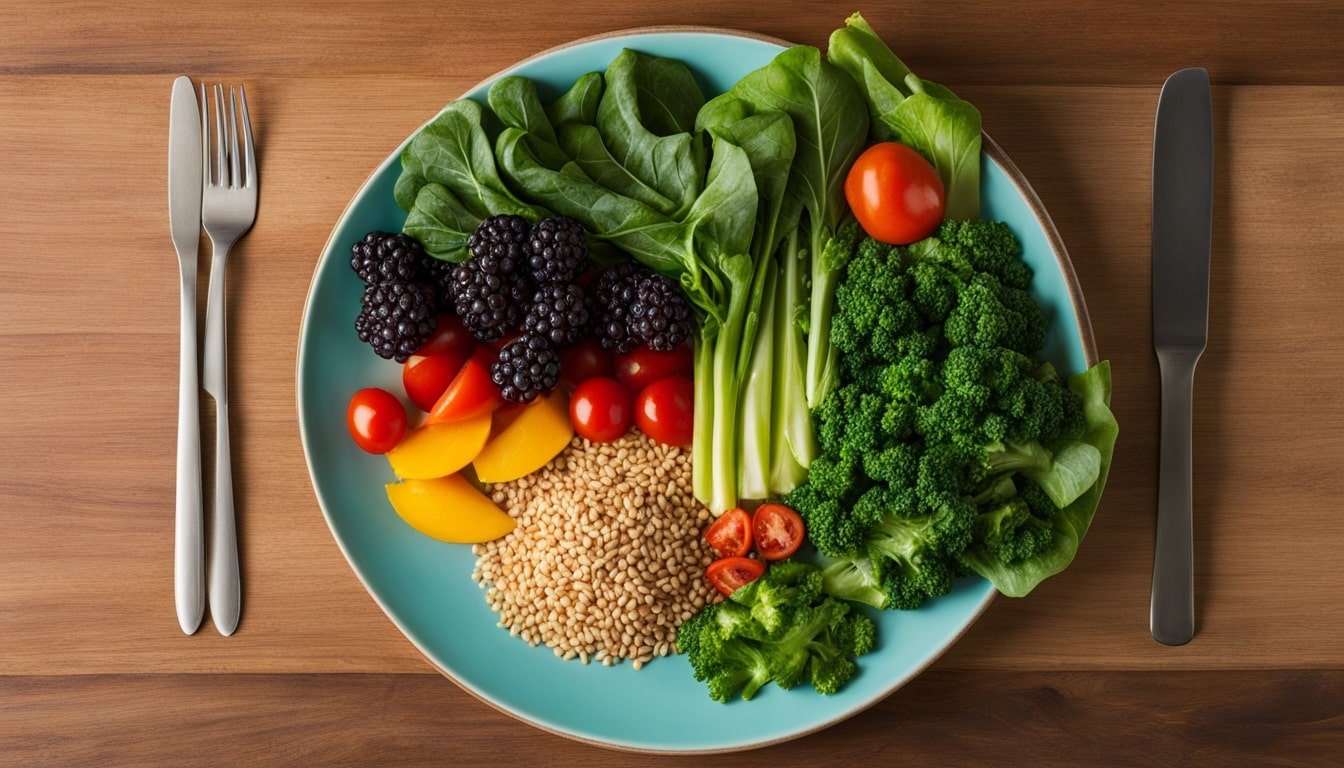Women often face unique challenges in losing weight, like hormonal changes and societal pressure. Luckily, there are many effective diets that help women reach their goals. These diets not only aid in weight loss but also boost heart health and brain function.
With so many diets out there, finding the right one can be tough. This article will look at some top diets for women. We’ll cover how they work, their health perks, and any downsides. This way, women can pick a diet that fits their lifestyle and goals.
Key Takeaways
- Effective weight loss diets for women offer benefits beyond just weight loss, such as improved heart health and reduced risk of chronic diseases.
- Finding the right diet plan that is sustainable and tailored to individual needs is essential for successful weight loss.
- Diets like the Mediterranean, DASH, and plant-based/flexitarian diets have been shown to be effective for weight loss in women.
- Principles of a healthy weight loss diet include balanced nutrition, sustainable lifestyle changes, and portion control with a calorie deficit.
- Intermittent fasting can also be an effective approach for weight loss, but requires consideration of individual circumstances and health factors.
The Mediterranean Diet
The mediterranean diet focuses on eating fruits, veggies, whole grains, legumes, nuts, and healthy oils like olive oil. It also includes some fish, poultry, and dairy, but less red meat and processed foods. This diet comes from the traditional eating habits of countries near the Mediterranean Sea, like Greece, Italy, and Spain.
How it Works
The mediterranean diet is all about eating whole, unprocessed foods. It suggests using olive oil as the main fat source. It also says to eat fish, poultry, and dairy in moderation. Red meat and processed foods should be eaten less.
Health Benefits
Eating the mediterranean diet can lower the risk of heart disease, stroke, and type 2 diabetes. It can also help with losing weight and keeping it off.
Other Benefits
- Improved brain health and cognitive function
- Reduced inflammation and risk of certain cancers
- Enhanced gut health and digestion
Downsides
The mediterranean diet is seen as a healthy choice, but it might not work for everyone. Some possible downsides are:
- It might be hard to follow, especially if you’re not used to Mediterranean food
- Eating too much could lead to weight gain
- Not getting enough nutrients if the diet is too limited
“The mediterranean diet is not just a diet, it’s a way of life that emphasizes the joy of eating well, being physically active, and enjoying time with family and friends.”
The DASH Diet

The DASH (Dietary Approaches to Stop Hypertension) diet focuses on plants to lower blood pressure and boost heart health. It was created by the National Institutes of Health to fight high blood pressure. Now, it’s known for helping with weight loss and managing health issues.
How it Works
This diet is all about eating whole, nutrient-rich foods like fruits, veggies, whole grains, lean meats, and low-fat dairy. It cuts down on sodium, added sugars, and bad fats. These changes help control blood pressure, manage weight, and lower disease risk.
Health Benefits
- Lowers blood pressure: The DASH diet is great at reducing high blood pressure, which is a big risk for heart disease and stroke.
- Promotes weight loss: Its balanced and nutrient-packed nature supports weight loss, especially with regular exercise.
- Reduces the risk of chronic diseases: Eating like the DASH diet might lower the risk of type 2 diabetes, some cancers, and cognitive decline.
Other Benefits
The DASH diet also helps fight depression symptoms and improves insulin resistance, a step before type 2 diabetes. By eating more whole, plant-based foods and less processed and high-sodium foods, it boosts overall health.
Plant-Based and Flexitarian Diets
Plant-based diets, like vegetarian and vegan diets, are getting more popular. They’re seen as good for health and the planet. The flexitarian diet is also gaining fans. It focuses on plant-based foods but lets you have some animal-based products now and then.
How It Works
At the heart of these diets are whole, minimally processed plant-based foods. Think fruits, veggies, whole grains, legumes, nuts, and seeds. These diets often cut down on or skip meat, poultry, and dairy products. But the flexitarian diet says it’s okay to have animal-based foods sometimes.
Health Benefits
- Improved metabolic health, which means a lower risk of type 2 diabetes and heart disease
- Lower blood pressure and cholesterol levels
- Potential for weight loss and keeping a healthy weight
- Less chance of getting some cancers
Downsides
Plant-based and flexitarian diets have their ups and downs. Some downsides include:
- It can be hard to get enough protein, iron, and vitamin B12 if not planned right
- It might feel restrictive and cause social challenges in some situations
- The sustainability of these diets depends on how well you can keep a flexible and balanced approach
Overall, these diets can help with weight loss, metabolic health, and lowering the risk of chronic diseases. But, they need careful planning and a sustainable, flexible approach for good nutrition and sticking with it long-term.
The MIND Diet

The MIND (Mediterranean-DASH Intervention for Neurodegenerative Delay) diet blends the Mediterranean diet and the DASH diet. It focuses on foods that boost brain health and lower the risk of Parkinson’s disease and other brain diseases.
How it Works
The MIND diet promotes eating plant-rich foods like leafy greens, nuts, berries, and whole grains. It also suggests eating olive oil, fish, and moderate red wine. On the other hand, it advises avoiding red meat, butter, cheese, and fried or fast foods.
Health Benefits
- Improved cognitive function and reduced risk of cognitive decline
- Lower risk of developing Parkinson’s disease
- Potential for weight loss and better overall cardiovascular health
Research shows that sticking to the MIND diet can slow down brain aging. It may even lower the risk of Parkinson’s disease. The diet’s focus on plant-based foods is key to these benefits.
“The MIND diet is a game-changer for brain health, combining the best of the Mediterranean and DASH diets to support cognitive function and reduce the risk of devastating neurodegenerative conditions.”
Weight Loss Diets For Women
There is no single best diet for weight loss in women. The best diets are those that focus on whole, nutrient-rich foods and limit processed and high-calorie ones. These diets help women lose weight for good and boost their health.
Some top diets for women include:
- The Mediterranean Diet – This diet is full of healthy fats, lean proteins, and fiber-rich carbs. It helps with weight loss and lowers the risk of chronic diseases.
- The DASH Diet – It cuts down on sodium and increases fruits, veggies, and low-fat dairy. This diet helps with weight loss and managing blood pressure.
- Plant-Based and Flexitarian Diets – These diets focus on whole plants with some animal products. They support weight loss and better metabolic health.
- The MIND Diet – A mix of the Mediterranean and DASH diets, it focuses on foods good for the brain. It can help with weight loss and brain health.
The best diet for weight loss is one that fits a woman’s lifestyle and health goals. With help from a healthcare provider or dietitian, women can create a diet plan that is safe and sustainable for losing weight.
Principles of Healthy Weight Loss Diet

For sustainable weight loss, a balanced approach is key. It includes proper nutrition, lifestyle changes, and managing portions. Here are the main principles for a healthy weight loss diet for women.
Balanced Nutrition
A diet for losing weight should focus on whole, natural foods. This means eating lots of fruits, vegetables, lean proteins, healthy fats, and complex carbohydrates. It’s also important to cut down on processed foods, added sugars, and high-sodium items. This helps with health and weight control.
Sustainable Lifestyle Changes
Weight loss is not just about quick fixes. It’s about making long-term, sustainable lifestyle changes. This could mean meal planning, mindful eating habits, and regular physical activity. Eating a plant-based or flexitarian diet can also help with weight loss and health.
Portion Control and Calorie Deficit
- Controlling your portion sizes is key to creating a calorie deficit, which is needed for weight loss.
- Being mindful of serving sizes and cutting down on high-calorie, nutrient-poor foods helps you stay in a calorie deficit without feeling hungry.
- Adding healthy snacks and drinking plenty of water can also aid in weight loss.
By focusing on a balanced diet, making sustainable lifestyle changes, and managing portions, women can achieve healthy and lasting weight loss.
Intermittent Fasting for Weight Loss

Intermittent fasting is a way to lose weight by eating and fasting in cycles. It has become popular for its health benefits and help with weight control.
How it Works
This method limits your eating to a certain time, usually 12 to 16 hours. You don’t eat during the fasting period. But, you can eat during the eating window. This cycle can help manage your metabolism, insulin levels, and appetite. It may lead to losing weight and burning fat.
Potential Benefits
- Supports weight loss by creating a calorie deficit
- Helps improve insulin sensitivity and blood sugar control
- May enhance fat burning and metabolism
- Promotes healthy circadian rhythms and sleep patterns
- Can improve family meals and social relationships
Considerations
Intermittent fasting can help with weight loss, but be careful. People with medical conditions like diabetes or heart disease should talk to a doctor first. It’s also key to keep a balanced lifestyle. Use portion control and calorie deficit for lasting weight control.
| Intermittent Fasting Schedules | Potential Benefits | Considerations |
|---|---|---|
| 16:8 (16 hours fasting, 8 hours eating) | Improved insulin sensitivity, increased fat burning, reduced appetite | May be challenging for some individuals, especially those with busy lifestyles |
| 24-hour fasts (1-2 times per week) | Enhanced metabolic flexibility, increased human growth hormone production | Requires significant discipline and may not be suitable for all individuals |
| Alternate-day fasting | Potential for greater weight loss, improved cardiovascular health | May be difficult to sustain long-term, increased risk of overeating on non-fasting days |
How well intermittent fasting works for weight loss varies by person. It depends on your health, lifestyle, and what you prefer. Always talk to a healthcare professional or a dietitian to make a plan that fits your needs and goals.
Low-Fat vs. Low-Carb Diets
Two diets, low-fat and low-carb, are popular for weight loss. Each has its own benefits and things to consider. Knowing about these diets can help you pick one that fits your health goals and likes.
Low-Fat Diets
Low-fat diets cut down on dietary fat, seen as a main cause of weight gain. They aim to make you eat fewer calories, helping you lose weight. These diets can also improve heart health by lowering heart disease risk and bettering cholesterol levels.
Low-Carb Diets
Low-carb diets, like the keto diet, reduce carbs. This makes your body use fat for energy instead of glucose. These diets are good for weight loss and managing type 2 diabetes by improving insulin sensitivity and fat burning.
| Comparison | Low-Fat Diets | Low-Carb Diets |
|---|---|---|
| Macronutrient Focus | Reduced fat intake | Reduced carbohydrate intake |
| Weight Loss Mechanism | Calorie deficit | Ketosis and fat burning |
| Impact on Heart Health | Potential to improve cholesterol levels | Mixed evidence on long-term effects |
| Nutrient Deficiencies | Possible deficiencies in fat-soluble vitamins | Potential for deficiencies in certain nutrients |
| Sustainability | Relatively flexible and balanced | May be more challenging to sustain long-term |
Choosing between a low-fat or low-carb diet depends on your health, likes, and lifestyle. Talking to a healthcare expert can help pick the best diet for you. This way, you can manage your weight well and keep it off for a long time diet and weight loss following this diet certain food dash diet lost easy to follow healthy diet weight loss program comes to weight loss.
Also Read : Natural Weight Loss Remedies for Women Guide
Conclusion
The best diets for women include the Mediterranean, DASH, Plant-Based, Flexitarian, and MIND Diets. Each diet focuses on balanced eating, making lifestyle changes, and controlling portions. These diets help with weight loss and improve health.
The Mediterranean Diet is all about eating healthy fats, whole grains, and lots of fruits and veggies. The DASH Diet is low in sodium but high in nutrients. Plant-Based and Flexitarian Diets push for more plant foods. The MIND Diet mixes the best of the Mediterranean and DASH for brain health.
For any diet, the key is balanced nutrition, making lasting lifestyle changes, and managing portions. By following these tips, you can reach your weight loss goals and boost your health.
FAQs
Q: What are some of the best weight loss diets for women?
A: Some effective weight loss diets for women include the Volumetrics diet, Weight Watchers (now known as WW), the Keto diet, the Atkins diet, and the Mediterranean diet.
Q: How can I choose the best weight loss diet for myself?
A: When selecting a weight loss diet, consider your food preferences, lifestyle, and any health conditions you may have. It’s important to choose a diet that is sustainable and fits your individual needs.
Q: Are fad diets effective for weight loss?
A: While fad diets may lead to rapid weight loss in the short term, they are often not sustainable and may not provide long-term weight loss results. It is recommended to focus on healthy, balanced eating plans for lasting results.
Q: What is the importance of diet and exercise for weight loss?
A: Both diet and exercise play crucial roles in weight loss. A combination of a healthy eating plan and regular physical activity can help you achieve and maintain a healthy body weight.
Q: Can certain diets contribute to weight loss and overall health?
A: Yes, certain diets, such as the Mediterranean diet and the DASH diet, have been shown to not only aid in weight loss but also improve overall health markers, such as heart health and blood pressure.
Q: How can I maintain weight loss in the long term?
A: To sustain weight loss in the long term, it’s important to adopt healthy eating habits, stay physically active, and make lifestyle changes that are sustainable for you. Regular monitoring and staying accountable can also help with weight maintenance.
Q: What is the Volumetrics diet and why is it effective for weight loss?
A: The Volumetrics diet focuses on eating low-calorie, nutrient-dense foods that make you feel full and satisfied. By emphasizing foods that are high in volume but low in calories, the Volumetrics diet can help with weight loss without leaving you feeling deprived.
